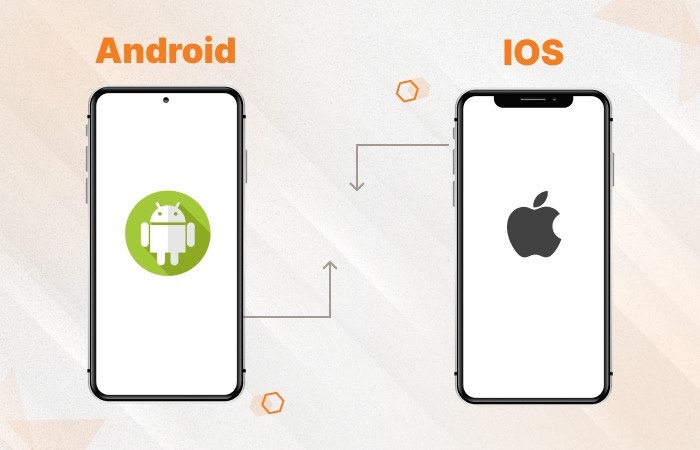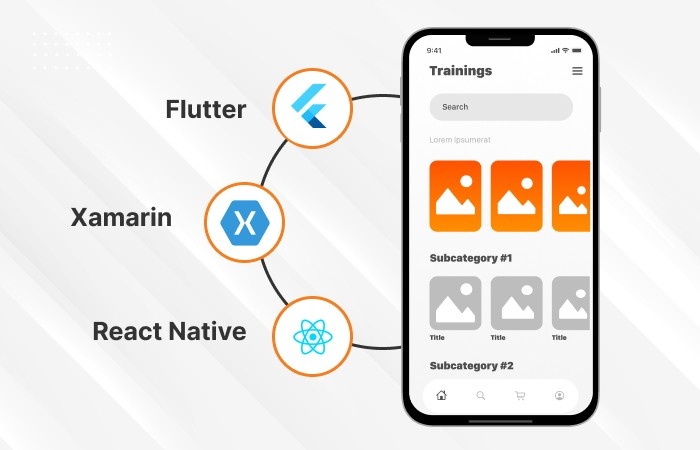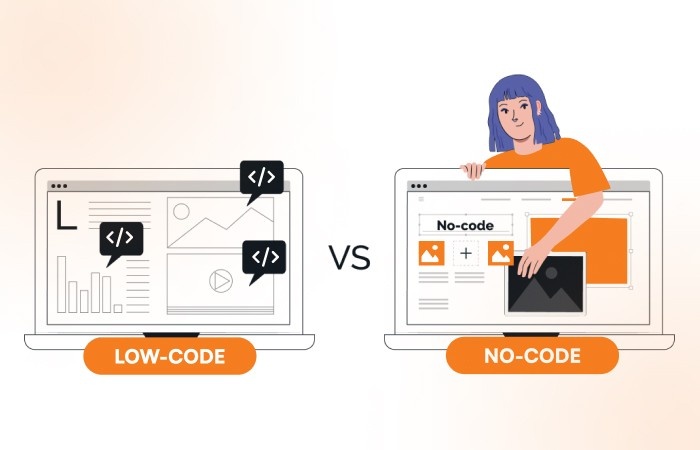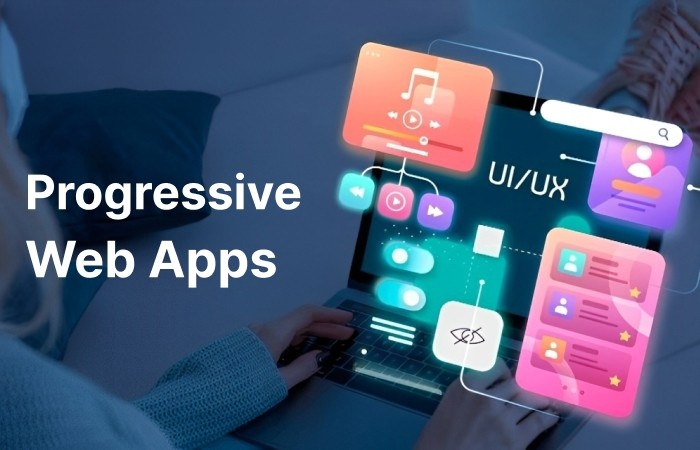
As per the reports, the mobile app development market was valued at USD 240.4 billion in 2023 and it is expected to reach USD 666.1 billion by 2032. Mobile apps are becoming an essential part of our daily lives as they allow users to access diverse services and information anywhere they want. Businesses mostly use mobile apps to engage with customers as demand increases. A reliable mobile app development company can help them improve efficiency and boost brand visibility by building high-quality apps that meet users’ needs. Read the blog and explore the top platforms to develop your mobile app. Let’s dive in.
Top Platforms to Build a Mobile App
Native Platforms
It is a tool that is used to develop mobile apps that work on a particular device. They build apps that are fast, secure, and offer better performance on each device’s operating system.

iOS
These apps are specially made for Apple devices. It uses programming languages like Objective-C and Swift.
Strengths:
- Optimized for Apple devices.
- Provides high-speed Performance.
- Enhances Security.
- Offers a seamless user experience.
Best For:
- Apps that require a high level of security.
- Provides excellent performance.
- Offers a premium experience for users.
Pros:
- Fast and efficient performance.
- Strong security features to protect user data.
- Works well with other Apple products like Mac and iPad.
Cons:
- Apps work only with Apple devices.
- Strict approval process on App Store.
Android
Android is an open-source platform where you can freely create and customised apps. It uses programming languages like Java and Kotlin to develop apps. Android helps apps to run on many different devices.
Strengths:
- It is compatible with various devices.
- Offers flexibility and customization.
Best For:
- Apps that need to reach a broader audience.
- It works on various smartphones and tablets.
Pros:
- Supports many different devices and brands.
- Easier approval process for apps on the Play Store.
- More freedom for customization and extra features.
Cons:
- Performance might vary across different devices.
- There are higher chances of security risks than iOS.
iOS is a great choice for building premium apps as developers can use iOS app builder tools to create high-quality applications. Android is an ideal choice for apps that need to reach a larger audience.
Cross-platform Framework

It is a framework that helps you build an app and works on iOS and Android with the help of a single codebase. Cross-platform saves you time and money from making separate apps for each platform. Below are the cross-platform app development platforms that you can consider :
Flutter
It is a free framework that allows developers to create applications for multiple platforms using one codebase.
Strengths:
- It is fast, user-friendly, and great for making the app smooth.
Best For:
- It is best for apps that need eye-catching design and high performance.
Pros:
- Uses one codebase for iOS and Android.
- Creates apps with smooth animations and a great look.
- Fast development with built-in tools.
Cons:
- Larger app size compared to others.
- Fewer third-party libraries than react native.
React Native
React Native is known for its fast development process. A skilled React Native developer uses this powerful JavaScript library to build user interfaces.
Strengths:
- It has a strong community support.
- It keeps your app balanced between performance and flexibility.
Best For:
- It is best for Minimum Viable Products (MVPs).
- The app needs native-like performance and easy updates.
Pros:
- It uses JavaScript Language which is widely used.
- Reusable code for both platforms.
- It has many pre-built libraries available.
Cons:
- It is slower than Flutter for complex animations.
- Some features need extra coding in the native language.
Xamarin
It is a Microsoft-owned framework that helps you to build cross-platform mobile apps using .Net.
Strengths:
- It is good for .NET developers.
- They work well with Microsoft Services.
Best For:
- It is best for business apps and enterprise solutions.
Pros:
- It uses .NET language which is famous for Microsoft applications.
- It provides near-native performance.
- Supports many device types.
Cons:
- The size of the application is bigger than react native.
- It is not widely used as Flutter and React Native.
Low-code/No-code Platforms

They allow you to create an application without or with limited coding knowledge. These platforms use visual tools like drag-and-drop components. It helps you to ease the development process of apps. Low-code platforms need minimal coding and these platforms are designed to speed up the app development process. Whereas, No-code platforms do not need any coding for building apps. Adalo and Bubble are popular tools for the No-code platform. OutSystems and Mendix are popular tools for the Low-code platform.
Strengths:
- Speeds up the process of app development.
- It makes visual interfaces more simple for non-programmers.
- Lowers the development cost by reducing the manual coding.
Best for:
- Small businesses and startups who are looking for quick solutions.
- Prototyping and building simple apps or Minimum Viable Products.
- Companies that need workflow automation without hiring developers.
Pros:
- User-friendly visual tools for faster development.
- Reduces time and effort as compared to traditional coding.
- Cost-effective alternative to hiring a development team.
Cons:
- Limited customisation option as compared to coding application.
- Not suitable for complex and large-scale applications.
- Some platforms need paid subscriptions for advanced features.
No-code platforms are the best mobile app development platform for simple applications. This platform needs minimal customisation for creating applications. A low-code platform offers more flexibility while still simplifying development.
Related Blog:- Why Personalised AI Models Are Key to Developing Innovative Mobile Apps
Progressive Web Apps

It is a web application designed to function like mobile apps. These apps are built with the help of web technologies. Web apps can easily be installed and run on every platform with a single codebase. It offers app-like features like offline access, push notifications, and fast loading times.
Strengths:
- Accessible on any device with a web browser.
- It doesn’t need installation from the app store.
- Loads quickly even when the internet connection is slow.
Best For:
- Businesses that need a mobile-friendly solution without creating a separate app for iOS and Android.
- E-commerce platforms, news websites, and online services.
- Companies that are looking for cost-effective alternatives to native apps.
Pros:
- No need for approval from the app store or downloads.
- Work across different devices and operating systems.
- Saves storage space as compared to traditional apps.
- Can function offline after the first visit.
Cons:
- Limited access to certain device features.
- It is not powerful enough as compared to native mobile apps.
- Some old devices may not support all progressive web app features.
How to Choose a Mobile App Platform
Development Budget
The Mobile App Development Cost of creating a mobile app depends on the app type, platform, and maintenance requirements. Simple apps are more affordable, while complex apps require a higher budget. Native apps often incur higher costs, whereas cross-platform development can save money. Hiring skilled developers increases expenses, but using low-code or no-code platforms can reduce costs. Choosing the right platform based on budget and business needs is crucial to maintaining a balance between cost, performance, and user experience.
App features and Complexity
The features and complexity of an app play a big role in deciding which platform to use. Simple apps with basic functions can be built easily on any platform. But, apps with advanced features need more powerful tools.
Native platforms (iOS and Android) handle complex features better, ensuring high performance. Cross-platform frameworks are good for medium-level complexity. Low-code/no-code platforms work easily with simple apps.
The construction process for an app becomes longer when developers incorporate extra features. Choosing the right platform depends on the app’s complexity, performance, and budget.
Time to Market
It refers to the amount of time an app will take to build and launch for users. This depends on the complexity of an app, speed, and the decisions that you’ve narrowed down.
Native apps mostly take a long time to develop an app as they need separate coding for each platform. The cross-platform framework enables you to build apps fast by using a single codebase. Low-code/no-code platforms are more faster. They use drag-and-drop tools to build apps without or with little coding.
Faster development helps businesses to launch apps quickly. This helps them to stay ahead of competitors and reduces the cost of development.
Future Scalability
It means how easily an app can grow and handle more users and features in the future. The platform you choose should allow the app to expand without major changes.
Native apps offer strong performance and flexibility, making them ideal for long-term growth. Cross-platform frameworks support scaling but might face some limitations for complex apps. Low-code/no-code platforms work well for simple apps but they struggle with large-scale extension.
Businesses must choose a platform that can handle updates, users, and new features without slowing down. Ensures that the app remains smooth and efficient for growth as the demand increases.
Conclusion
Picking the right mobile app platform depends on the app’s type, budget, and complexity. Native platforms offer the best performance and security but need more time and cost. The Cross-platform frameworks save your time and cost to build the app by using a single codebase. Low-code/No-code platforms make the app development process faster and easier. But they might struggle with the complex apps. PWAs offer a simple and cost-effective way to reach more users through web browsers.
Businesses should consider their needs before selecting a platform. The right choice ensures a smooth user experience, better performance, and future growth. With proper planning, businesses can build a successful mobile app. This will help them to meet user expectations more easily.
Looking for the best mobile app development company? Awebstar is here to help. Our expert team of app developers will help you to meet your needs and delight your users. For more details related to the mobile app platform, call +65 6909 9163 to speak with our experts.